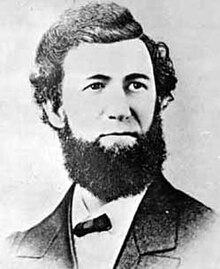Nelly Gray (song)

"Darling Nelly Gray" is a 19th-century popular song written and composed by Benjamin Hanby. It is written as from the point of view of an African-American male slave in Kentucky whose sweetheart has been taken away by slave-owners. The man mourns his beloved, who has been sold South to Georgia (where the slave’s life was conventionally regarded as harsher). He eventually dies and joins her in heaven.
History
Hanby composed the song while attending Otterbein University in Westerville, Ohio in 1856, in response to the plight of a runaway slave named Joseph Selby or Shelby. Benjamin Hanby's father, Bishop William Hanby, a United Brethren minister who was active in the Underground Railroad, was attempting to raise money to free Selby's beloved.
The tune was subsequently used by Geordie music hall singer Joe Wilson to set his song Keep yor feet still Geordie hinny and by trade union activist and Industrial Workers of the World member Ralph Chaplin, to set The Commonwealth of Toil.[1]
A recording by Louis Armstrong and The Mills Brothers was very popular in 1937 reaching the charts of the day.[2] Maxine Sullivan recorded the song for Vocalion on October 22, 1937[3] and Bing Crosby recorded it for Decca Records on April 25, 1938.[4]
Lyrics
There's a low, green valley, on the old Kentucky shore.
Where I've whiled many happy hours away,
A-sitting and a-singing by the little cottage door,
Where lived my darling Nelly Gray.
Chorus
Oh! my poor Nelly Gray, they have taken you away,
And I'll never see my darling any more;
I'm sitting by the river and I'm weeping all the day.
For you've gone from the old Kentucky shore.
When the moon had climbed the mountain and the stars were shining too.
Then I'd take my darling Nelly Gray,
And we'd float down the river in my little red canoe,
While my banjo sweetly I would play.
One night I went to see her, but "She's gone!" the neighbors say.
The white man bound her with his chain;
They have taken her to Georgia for to wear her life away,
As she toils in the cotton and the cane.
My canoe is under water, and my banjo is unstrung;
I'm tired of living any more;
My eyes shall look downward, and my song shall be unsung
While I stay on the old Kentucky shore.
My eyes are getting blinded, and I cannot see my way.
Hark! there's somebody knocking at the door.
Oh! I hear the angels calling, and I see my Nelly Gray.
Farewell to the old Kentucky shore.
Chorus
Oh, my darling Nelly Gray, up in heaven there they say,
That they'll never take you from me any more.
I'm a-coming-coming-coming, as the angels clear the way,
Farewell to the old Kentucky shore!
Gallery
-
Darling Nelly Gray, page two
-
Darling Nelly Gray, page three
See also
Notes
- ^ Manfred H (ed.). "The Commonwealth of Toil (Ralph Chaplin) (1910s)". www.folkarchive.de. Retrieved 14 March 2017.
- ^ Whitburn, Joel (1986). Joel Whitburn's Pop Memories 1890-1954. Wisconsin, USA: Record Research Inc. p. 490. ISBN 0-89820-083-0.
- ^ "The Online Discographical Project". 78discography.com. Retrieved July 26, 2017.
- ^ "A Bing Crosby Discography". BING magazine. International Club Crosby. Retrieved July 26, 2017.
External links
- Text and RealAudio for versions collected in the field by Max Hunter:


